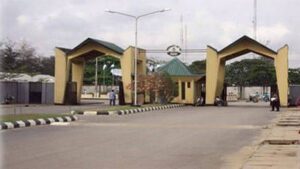In today’s digital age, having access to fast and reliable WiFi is a must for students. At the forefront of this digital revolution lies education, and access to the internet plays a pivotal role in acquiring and developing crucial skill sets.
Universities with the best WiFi facilities offer more than just connectivity; they provide an essential tool for academic success, online learning, and seamless communication. Reliable internet access, particularly through WiFi facilities in universities, serves as a foundation for students seeking to build their digital toolkit. Access to the internet on campuses creates a breeding ground for online learning, allowing students to access a vast pool of educational resources, collaborate with peers remotely, and participate in innovative digital learning platforms.
While many private universities in Nigeria are known for offering free WiFi to their students, several federal universities also provide exceptional internet services.
This article highlights the top 10 universities in Nigeria with the best WiFi, so you can find the perfect place to build your digital skills online.
1. Obafemi Awolowo University (OAU)
OAU in Ile-Ife is renowned for its academic excellence and its commitment to providing reliable internet access. The university has invested heavily in its IT infrastructure, ensuring that students have uninterrupted access to WiFi across various places in the school including departments and hostels.

2. University of Ilorin (Unilorin)
Unilorin is known for its disciplined academic environment and also for its dependable WiFi facilities. The university's commitment to maintaining a conducive learning environment extends to providing students with uninterrupted internet services across the campus.

3. University of Ibadan (UI)
As Nigeria's oldest university, UI has kept pace with technological advancements by offering reliable WiFi services to its students. The WiFi network covers lecture halls, libraries, and residential areas, ensuring that students can stay connected at all times.

4. University of Lagos (Unilag)
Located in Lagos, Unilag offers one of the most robust WiFi networks in the country. With coverage across the campus, students and staff can enjoy uninterrupted internet access for research, virtual classes, and global connectivity.

5. University of Nigeria, Nsukka (UNN)
UNN is committed to enhancing its IT services, offering dependable WiFi throughout the campus. The university provides both free and paid WiFi options, ensuring that students and staff can access online resources easily.

6. Ahmadu Bello University (ABU Zaria)
ABU, located in Zaria, is one of Nigeria’s largest universities. The university provides free WiFi in many areas, supporting students in their studies and research with a stable internet connection access across its large campus.

7. University of Jos (Unijos)
Unijos offers a solid WiFi network that supports both academic and extracurricular activities. The university’s commitment to providing a conducive learning environment includes ensuring that students have access to reliable internet for research and communication.

8. University of Uyo (Uniuyo)
Uniuyo's WiFi network is known for its reliability and coverage, making it a top choice for students who require consistent internet access. The university prioritises digital connectivity to support academic excellence and student life.

9. Federal University of Technology Akure (FUTA)
FUTA is known for its focus on technology and innovation, which is reflected in its excellent WiFi facilities. The university’s internet services are steady, providing students with the connectivity required for their technological studies and research.

10. Federal University of Technology Minna (FUT Minna)
FUT Minna continues to invest in its digital infrastructure, providing students with a robust WiFi network. The university's focus on technological advancement is evident in its reliable internet services, which are crucial for academic research and innovation.
How to Leverage Wi-Fi Facilitates in Your School
Enroll in Online Courses: Online courses, such as those offered on platforms like Udemy and Coursera, provide an excellent opportunity to expand your knowledge beyond the academic curriculum. These courses cover a wide range of subjects for digital skills and personal development. Enrolling in these courses allows you to gain additional skills and explore new areas of interest. The flexibility of online learning means you can study at your own pace, fitting courses around your existing schedule.
Engage in Online Forums and Discussion Groups: Participate in online forums and discussion groups related to your field of study. Platforms like Reddit, Quora, and specialized academic forums offer spaces where you can ask questions, share knowledge, and engage in discussions with peers and experts. This can enhance your understanding of complex topics and provide different perspectives on various issues.
Subscribe to Educational Podcasts and YouTube Channels: Stay informed and entertained by subscribing to educational podcasts and YouTube channels. Many experts and educators share valuable insights, tutorials, and lectures through these mediums. This can provide additional perspectives on your studies and keep you updated on the latest developments in your field.
Utilise Educational Apps: Download and use educational apps that can aid your learning. Apps like Google Keep for note-taking, Trello for project management, Grammarly for writing assistance, PDF readers for accessing and annotating documents, and Google Slides for creating presentations can help you stay organised and improve your academic skills. Additionally, time management apps like Todoist or Pomodoro timer can help you manage your study sessions effectively. Many educational apps also offer interactive elements and gamified learning experiences to make studying more engaging.
Participate in Online Competitions and Challenges: Engage in online academic or skill-based competitions and challenges. Websites and platforms often host contests related to coding, writing, design, and other areas. Participating in these events can help you apply your knowledge in practical scenarios, gain recognition, and potentially earn awards or certificates.
Utilise E-Learning Platforms for Certification: Enrol in certification courses offered by e-learning platforms. Many of these platforms provide industry-recognised certifications that can enhance your qualifications and make you more competitive in the job market. Certifications can be in areas like Microsoft, Project management, Data analysis, or Digital marketing, among others.
Access Educational Resources: WiFi access enables you to use online libraries, academic journals, research databases, and educational videos. Platforms like JSTOR, Google Scholar, and Project MUSE provide access to a wealth of academic papers and research materials. Many universities and public libraries also offer online access to their resources. Educational videos on some platforms can supplement your learning by offering visual explanations and interactive content.
Practice on Online Learning Platforms: Utilize interactive learning platforms for skill development, quizzes, and simulations. Websites like Duolingo, Codecademy, and W3school offer interactive exercises and practice tests that help reinforce what you’ve learned. These platforms often feature gamified elements, making learning more engaging and effective. Simulations and virtual labs available through educational platforms can provide hands-on experience in a controlled, digital environment, which is particularly useful for subjects like science and engineering.
Conclusion
When choosing a university, it's important to consider the quality of the WiFi facilities as part of your decision-making process. Reliable internet access not only enhances your learning experience but also plays a crucial role in developing essential digital skills. These skills are increasingly important in today’s academic and tech-driven world. The universities listed above are leading the way in providing the best internet facilities in Nigeria, ensuring that students have the tools they need to excel. By prioritising institutions with strong WiFi infrastructure, you’ll be better equipped to access online resources, participate in digital learning, and build the competencies required for the digital age